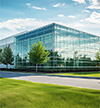1. Worker Mobility (1/8)

JLL Says:
The virtual workplace is becoming commonplace with an ever-evolving menu of laptops, cell phones, and PDAs. CRE professionals are cutting costs and maximizing productivity by working with employees' flexible schedules.
Cost Reduction Through Mobile Offices and Nontraditional Uses for Existing Spaces
Flexible, On-Demand Offices Cut Real Estate Costs
Next: Sustainability
2. Sustainability (2/8)

JLL Says:
Energy and sustainability have become top CRE concerns in recent years. CRE executives are increasingly implementing workplace strategy to cut carbon emissions - and costs.
In Focus: Implementing Sustainability Practices in the Workplace
In Focus: 5 Reasons You Need an Energy Efficiency System
Benefits of Greening Your Facility
Next: Occupancy Planning
3. Occupancy Planning (3/8)

JLL Says:
As the size of business departments fluctuates, companies must determine how to eliminate "dark space" - vacant or underutilized areas - and use existing space more effectively.
In Focus: Cutting the Cost of Excess Space Might be Easier Than You Think in Today's Economy
Cost Reduction Through Mobile Offices and Nontraditional Uses for Existing Spaces
Flexible, On-Demand Offices Cut Real Estate Costs
Next: Flexibility
4. Flexibility (4/8)

JLL Says:
The business world is unpredictable, especially in today's volatile market, making it even more important for CRE divisions to prioritize flexibility. That may mean shorter leases, expansion/contraction options, and adjustable facility layouts.
The Office Space Revival
Cost Reduction Through Mobile Offices and Nontraditional Uses for Existing Spaces
Flexible, On-Demand Offices Cut Real Estate Costs
Next: Accessing the Right Labor
5. Accessing the Right Labor (5/8)

JLL Says:
Despite high unemployment rates, companies are still competing for the best workers. Forming location strategies based on labor requirements can help narrow the list of site options.
Labor Trumps Other Factors in the Location Decision
Labor Costs: The Number-One Site Selection Factor
First Person: Attracting Generation Y Talent to the Workplace
Next: Capital Planning
6. Capital Planning (6/8)

JLL Says:
Although budgets may be tight, a company must always account for maintenance, repair, and renovation to ensure safety and employee comfort. With Life-Cycle Asset Management Tools, CRE executives can plan for these expenses.
The Business Life Cycle Effect
When Is Bargain Commercial Real Estate a Steal?
Managing the Complexity of Large, Capital-Intensive Projects
Next: Lease Accounting
7. Lease Accounting(7/8)

JLL Says:
In the near future, changes in leasing structure will turn operating leases into capital leases. That will change how CRE professionals administer and report leases. Executives must take care to implement analysis and lease administration systems to meet new requirements.
Financial Real Estate Strategies for 2010
The Importance of Lease Administration
Tenants: Don't Wait, Act Now on Lease Negotiations
A Commercial Tenant's Guide to Lease Terms


